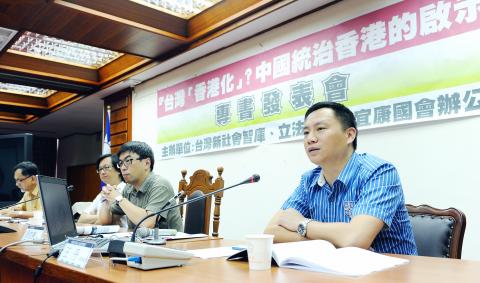Taiwan has paid too little attention to the civil movement in Hong Kong and could be the next in line to be absorbed by Beijing if the trend continues, politicians and political observers said at a panel discussion in Taipei yesterday.
Hong Kong, which was handed back to China by the UK in 1997, could serve as a perfect example for Taiwan in its efforts to defy Chinese political pressure and influence, said Wang Dan (王丹), a Chinese dissident who now teaches at National Tsinghua University in Hsinchu.
Wang was one of the guest speakers at a panel discussion on the theme of “Taiwan’s Hong Kong-ization,” which is also the theme of a book published by New Society for Taiwan, a think tank and co-organizer of the event.

Photo: Chang Chia-ming, Taipei Times
Democratic Progressive Party (DPP) Legislator Tuan Yi-kang (段宜康), the other co-organizer, moderated the discussion.
Taiwan has already been “Hong Kong-ized,” Wang said, because government agencies, institutions and media outlets have all learned to “self-discipline” themselves in what can and cannot be done in much the same fashion as their Hong Kong counterparts prior to the 1997 handover.
Second, as with Hong Kong, China has used its economic power to influence Taiwanese politics, Wang said.
Wang agreed with the idea of advocating a “cross-strait alliance of civil movements” between people in China, Hong Kong and Taiwan, saying that it could be the only effective way to stop Taiwan from “Hong Kong-ization.”
Wang predicted that the increasing political participation of those born after 1990 would play a critical role in Hong Kong’s civil movement in the future because this young generation is now “even more anti-communist than their parents and more active in speaking their minds and participating in politics.”
Emily Lau (劉慧卿), a member of the Legislative Council of Hong Kong and vice president of the Hong Kong Democratic Party, said via video teleconference that China had not won the hearts of people in Hong Kong even 15 years after the handover.
The “one country, two systems” mechanism was originally designed by Beijing for Taiwan, but it was implemented in Hong Kong first, Lau said, adding that the results and process of the implementation could serve as a reference for Taiwan.
Chang Tieh-chih (張鐵志), a political commentator, said China has been getting impatient with the civil movement in Hong Kong in recent years, but everything it did “pushed Hong Kong people further from China.”
Hong Kong paid little attention to Taiwan in the past, former DPP legislator Lin Chuo-shui (林濁水) said, even though both have walked similar historical paths — both were ceded by China after wars and both advanced economically before China.
However, both sides appeared to “connect” to each other after the 1997 handover as people in Hong Kong looked to Taiwan as a political inspiration and model.
In a recent poll, Taiwan ranked as the favorite foreign nation among Hong Kong residents, he said, adding that “a democratic Taiwan out of China’s control would be a pillar for Hong Kong’s democratic movement.”

An essay competition jointly organized by a local writing society and a publisher affiliated with the Chinese Communist Party (CCP) might have contravened the Act Governing Relations Between the People of the Taiwan Area and the Mainland Area (臺灣地區與大陸地區人民關係條例), the Mainland Affairs Council (MAC) said on Thursday. “In this case, the partner organization is clearly an agency under the CCP’s Fujian Provincial Committee,” MAC Deputy Minister and spokesperson Liang Wen-chieh (梁文傑) said at a news briefing in Taipei. “It also involves bringing Taiwanese students to China with all-expenses-paid arrangements to attend award ceremonies and camps,” Liang said. Those two “characteristics” are typically sufficient

A magnitude 5.9 earthquake that struck about 33km off the coast of Hualien City was the "main shock" in a series of quakes in the area, with aftershocks expected over the next three days, the Central Weather Administration (CWA) said yesterday. Prior to the magnitude 5.9 quake shaking most of Taiwan at 6:53pm yesterday, six other earthquakes stronger than a magnitude of 4, starting with a magnitude 5.5 quake at 6:09pm, occurred in the area. CWA Seismological Center Director Wu Chien-fu (吳健富) confirmed that the quakes were all part of the same series and that the magnitude 5.5 temblor was

The brilliant blue waters, thick foliage and bucolic atmosphere on this seemingly idyllic archipelago deep in the Pacific Ocean belie the key role it now plays in a titanic geopolitical struggle. Palau is again on the front line as China, and the US and its allies prepare their forces in an intensifying contest for control over the Asia-Pacific region. The democratic nation of just 17,000 people hosts US-controlled airstrips and soon-to-be-completed radar installations that the US military describes as “critical” to monitoring vast swathes of water and airspace. It is also a key piece of the second island chain, a string of

The Central Weather Administration has issued a heat alert for southeastern Taiwan, warning of temperatures as high as 36°C today, while alerting some coastal areas of strong winds later in the day. Kaohsiung’s Neimen District (內門) and Pingtung County’s Neipu Township (內埔) are under an orange heat alert, which warns of temperatures as high as 36°C for three consecutive days, the CWA said, citing southwest winds. The heat would also extend to Tainan’s Nansi (楠西) and Yujing (玉井) districts, as well as Pingtung’s Gaoshu (高樹), Yanpu (鹽埔) and Majia (瑪家) townships, it said, forecasting highs of up to 36°C in those areas